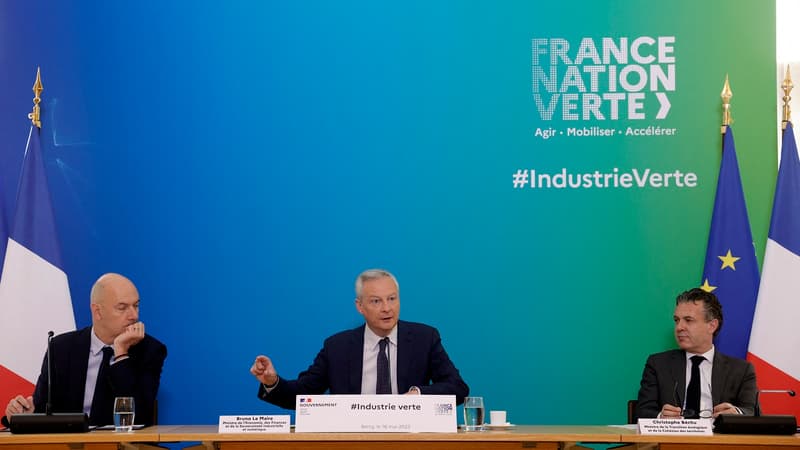“To make France the first low-carbon nation in Europe.” Bruno Le Maire presented this Tuesday in the Council of Ministers the “green industry” bill aimed at promoting carbon-free reindustrialization in France.
Referring to the 300 net creations of factories since 2017, the Minister of Economy specified that the objective was to accelerate the movement: to raise the participation of the industry to 15% of national wealth in the coming years, compared to approximately 10% currently, a ratio cut in half. in fifty years.
In detail, this 13-article bill should make it possible to reduce the French carbon footprint by 41 million tons of CO2 by 2030, or 1% of the total. Summary of the main measures.
• Cut implementation times in half
To facilitate the establishment of industrial sites, the government intends to shorten the authorization procedures by dividing by two to a maximum of nine months, from the current 17 months.
For “projects of great national interest” such as gigafactories, the State will control all procedures by decree.
• Offer 50 “France 2030” sites
Due to the scarcity of land, the bill dedicates one billion euros to “clean up” vacant land, with the aim of pre-developing and pre-equipping 50 plots, that is, some 2,000 hectares, so that they are “immediately available when a company wants to set up a new factory in France”.
• “Green Industry” Tax Credit
In response to the very proactive policy of the US “Reducing Inflation Act” as well as the Chinese energy boom, a “green industry tax credit” will aim to attract industrial investment in batteries, heat pumps, wind turbines and solar panels. – not hydrogen which already enjoys specific support.
This tax credit will cover 20% to 45% of the investments made, taking advantage of a recent relaxation of European state aid rules for green technologies. The Government expects some 23,000 million euros of investment by 2030 and the creation of 40,000 direct jobs.
The cost of the system is estimated at 500 million euros per year, or 2 billion euros at the end of the five-year period, explained Bruno Le Maire about BFM Business. Une charge censée être compensée par un déplafonnement du malus sur les vehicules polluants, the greening of the fleet of companies or a limitation des dépenses dites “brunes” en faveur des énergies fossiles, the one that will be debated in the cadre de la prochaine loi de finances In autumn.
• Reform of the ecological bond
The ecological bonus for the purchase of an electric car will be reformed to take into account the carbon footprint of its production in Europe.
“This bonus represents €1.2 billion a year, 40% of which has already left Asia since January 2023. However, we do not intend to finance the development of factories in Asia with public funds. Therefore, we want to exclude the electric vehicles with low environmental performance from the rebate,” Bruno Le Maire stated, citing emission criteria linked “to manufacturing, such as the carbon footprint of the steel used or the use of recycled and bio-based materials.”
• Mobilize 5,000 million euros of private savings
To finance the green industry, the government wants to mobilize 5,000 million euros in private savings. This will mean, in particular, the launch of a “future climate plan” for minors, a new savings product whose annual collection could reach one billion euros. A measure that the minister had mentioned on Monday on BFMTV and RMC. PER and life insurance will also have to be partly dedicated to green investment.
• Support for the decarbonization of existing industries and training
The executive’s bill provides for subsidies for the decarbonisation of existing industries, up to 2.3 billion euros in direct loans or guarantees from Bpifrance, while 700 million euros will be allocated to training, with the aim of training 50,000 engineers per end of the five-year period. term.
• Triple E label
The government wants to direct public procurement more towards “environmentally virtuous products”. For this, a Triple E Label (European Environmental Excellence) will be implemented.
“This label will represent a plus for any company that behaves virtuously, in particular with privileged access to public procurement, which represents 150,000 million euros a year,” explained Bruno Le Maire.
Source: BFM TV


